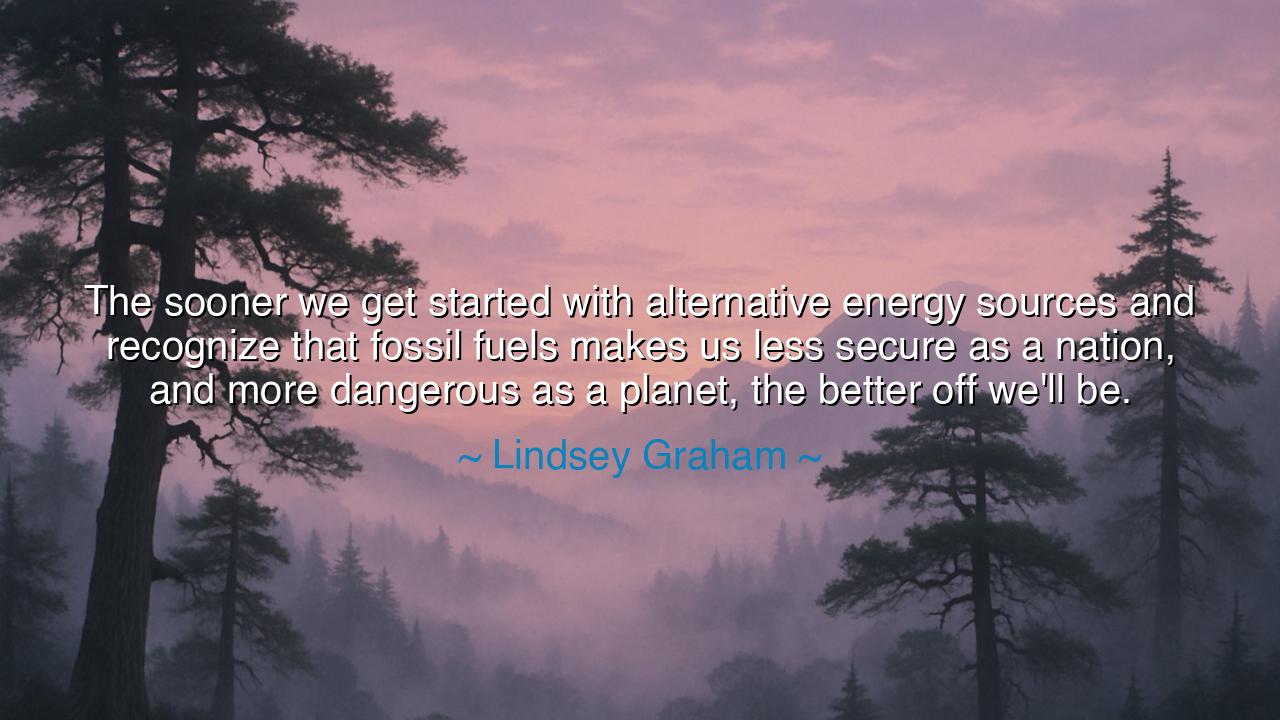
The sooner we get started with alternative energy sources and
The sooner we get started with alternative energy sources and recognize that fossil fuels makes us less secure as a nation, and more dangerous as a planet, the better off we'll be.






When Lindsey Graham declared, “The sooner we get started with alternative energy sources and recognize that fossil fuels make us less secure as a nation, and more dangerous as a planet, the better off we’ll be,” he spoke with the urgency of one who has glimpsed both the promise and peril of humanity’s choices. His words rise not merely as political counsel, but as a moral appeal—a call to awaken from the long slumber of dependence on that which poisons the very ground we walk upon. Beneath his statement lies a timeless truth: that civilizations rise or fall according to how they harness their sources of power, and that wisdom demands we choose those which sustain life, not destroy it.
In the manner of the ancients, Graham’s words could be read as a warning delivered by a watchman upon the city walls. The fossil fuels that once lit our lamps and forged our steel have become the chains that bind our destiny. What began as humanity’s triumph over darkness has turned into a slow corrosion of the world’s stability—filling the sky with smoke, the seas with acid, and the air with heat. Graham reminds us that what once served us now enslaves us, for dependence upon such fuel breeds both insecurity and danger. Nations that cling to finite resources grow anxious and divided, fighting for control of wells and pipelines while the planet itself withers beneath their struggle. The ancient sages would have called this hubris, the arrogance that precedes the fall of empires.
History, indeed, offers its mirrors. Consider the mighty Roman Empire, whose roads and aqueducts were marvels of human ingenuity. Yet Rome, too, became addicted—to conquest, to the plunder of lands, to the illusion that endless expansion could sustain it forever. Its strength became its weakness, its abundance a burden it could no longer bear. In the same way, modern civilization has feasted upon the stored fire of the Earth—oil, coal, and gas—without reckoning the cost. The Earth, like a patient mother, endured our hunger for centuries, but now she groans beneath the weight. Graham’s warning thus echoes through the corridors of history: no empire can endure when its foundations are built upon exploitation rather than renewal.
“The sooner we get started,” he urges—not with impatience, but with clarity. For the clock of nature does not pause while man debates. Every moment of delay deepens the wound; every hesitation widens the storm. To embrace alternative energy is not to abandon progress, but to restore balance. The winds that sweep the plains, the sun that burns above the deserts, the tides that rise and fall—all these are ancient gifts, waiting to be honored once more. In them lies freedom, for they belong to no nation and can be taken from no people. To turn to them is to remember that true security is born not of hoarding, but of harmony with creation.
And what is security, if not the peace of knowing that one’s children will inherit a livable world? Graham’s words reach beyond policy to the heart of responsibility. A nation that relies upon dwindling resources becomes vulnerable—to conflict, to foreign power, to the whims of nature herself. But a nation that learns to thrive on renewable energy becomes sovereign, not only in politics but in spirit. It becomes a guardian rather than a conqueror, a steward rather than a consumer. The ancients taught that the wise ruler plants trees under whose shade he will never sit. So too must modern humanity build an energy future that it may not see in full bloom, but from which generations will draw life.
There is, in Graham’s warning, also a moral reckoning. He speaks of being “more dangerous as a planet,” reminding us that the crisis is not confined to borders or governments—it is planetary, universal. As long as we burn the earth for our comfort, we endanger not only our security but the sacred web of life itself. The glaciers melt, the forests burn, the seas rise—not as punishment, but as consequence. Nature is not vengeful, but exact. She gives freely, but demands balance. Those who violate that balance invite their own undoing. Thus, Graham’s plea is both practical and spiritual: to see energy not as dominion, but as covenant.
Let this be the teaching carried forward: the strength of a civilization lies not in how much it consumes, but in how wisely it renews. Let every citizen and leader remember that the future will judge not our comfort, but our courage—the courage to act before the hour grows too late. Invest in the wind, the sun, the earth’s warmth; teach the young that progress and preservation are not enemies, but twins. For the age of fire has run its course, and the age of light must now begin. The sooner we begin, as Graham has said, the sooner humanity will step out of the shadow of dependence and into the dawn of true security, sustainability, and wisdom.






AAdministratorAdministrator
Welcome, honored guests. Please leave a comment, we will respond soon